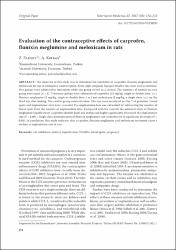Evaluation of the contraceptive effects of carprofen, flunixin meglumine and meloxicam in rats

View/
Access
info:eu-repo/semantics/openAccessDate
2017Access
info:eu-repo/semantics/openAccessMetadata
Show full item recordAbstract
The objective of this study was to determine the suitability of carprofen, flunixin meglumine and meloxicam for use in emergency contraception. Forty-eight pregnant Sprague-Dawley rats were used as material. Five groups were subjected to treatments while one group served as a control. The numbers of animals in each group were equal (n = 8). Treatment groups were administered carprofen (10 mg/kg, single or double dose, s.c.), flunixin meglumine (5 mg/kg, single or double dose, i.m.) and meloxicam (2 mg/kg, a single dose, s.c.) on the third day after mating. The control group received saline. The rats were sacrificed on Day 7 of gestation. Luteal spots and implantation sites were recorded. Pre-implantation loss was calculated by subtracting the number of luteal spots from the number of implantation sites. Compared with the control, the administration of flunixin meglumine (double dose), carprofen (double dose) and meloxicam highly significantly decreased the implantation rate (P < 0.001). Single dose administration of flunixin meglumine and carprofen led to significant decreases (P < 0.01). In conclusion, this study indicates that carprofen, flunixin meglumine and meloxicam treatment cause a decline in implantation rate in rats.

















